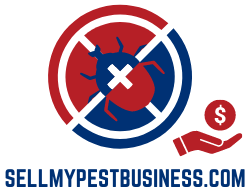Preparing Early for a Business Sale: Key Strategies for Success
Start planning years ahead to ensure a smooth and profitable sale.

Introduction
Selling a pest control business is one of the most significant decisions an owner can make. However, it’s not a process that should be rushed. Starting early—months or even years before you plan to sell—gives you the opportunity to optimize every aspect of your business for maximum value. Early preparation not only ensures a smoother transition but also attracts higher-quality buyers. In this blog, we’ll outline key strategies to set your business up for success long before the sale process begins.
1. Optimize Financial Performance
Your financial records are the backbone of your business valuation. Starting early allows you to refine these metrics to maximize your sale price.
Why It Matters:
- Buyers look for businesses with steady revenue, strong profit margins, and clean financial documentation.
- Optimized financials inspire confidence, reducing the risk of renegotiation or lower offers during the sale process.

Action Tips:
- Cut Unnecessary Costs:
- Conduct a thorough review of your expenses to identify areas where you can reduce spending without affecting service quality.
- Negotiate better rates with vendors and suppliers.
- Increase Revenue Streams:
- Offer additional services like termite control, wildlife removal, or eco-friendly pest treatments to diversify income.
- Focus on recurring service contracts to ensure predictable revenue.
- Monitor Key Financial Metrics:
- Track EBITDA (Earnings Before Interest, Taxes, Depreciation, and Amortization) as a key performance indicator of profitability.
- Use financial reporting tools to generate easy-to-read summaries for potential buyers.

2. Secure Long-Term Customer Contracts
Recurring revenue is one of the most attractive features of a pest control business. Buyers see long-term contracts as a safeguard against future revenue loss.
Why It Matters:
- Predictable income reduces buyer risk, increasing your business’s appeal and valuation.
- Loyal customers also provide referrals, driving future growth.
Action Tips:
- Transition to Auto-Renewing Contracts:
- Offer discounts or perks for customers who agree to auto-renewing service agreements.
- Highlight the percentage of recurring revenue during buyer presentations.
- Enhance Retention Programs:
- Introduce loyalty programs that reward repeat customers with discounts, priority scheduling, or free add-ons.
- Use customer satisfaction surveys to identify areas for improvement and address concerns promptly.
3. Build a Strong Team
A knowledgeable and committed team is one of your greatest assets. Buyers are more likely to invest in businesses where key employees are motivated to stay post-sale.
Why It Matters:
- High employee turnover can be a red flag for buyers, signaling instability or management challenges.
- A reliable team ensures operational continuity during the transition.

Action Tips:
- Offer Retention Bonuses:
- Provide financial incentives for employees who commit to staying through the transition period.
- Highlight these programs to reassure buyers of workforce stability.
- Invest in Training:
- Enhance employee skills through workshops, certifications, or cross-training.
- Create a team of versatile technicians who can handle a variety of pest control challenges.

4. Modernize Operations
Streamlined operations are not only more efficient but also more appealing to buyers. Modernizing your processes can improve profitability and reduce the complexity of ownership transfer.
Why It Matters:
- Buyers prefer businesses with updated systems that are easy to manage and integrate into their portfolios.
- Modern tools enhance customer satisfaction, leading to better retention rates.
Action Tips:
- Implement CRM Software:
- Use a customer relationship management (CRM) system to centralize customer data, scheduling, and communication.
- Highlight your CRM’s capabilities during buyer negotiations.
- Optimize Routing and Scheduling:
- Invest in route optimization software to reduce fuel costs and improve technician productivity.
- Use scheduling tools that allow customers to book appointments online for added convenience.
- Automate Billing and Invoicing:
- Transition to automated billing systems that ensure timely payments and reduce administrative workload.
5. Highlight Growth Opportunities
Buyers are drawn to businesses with untapped potential. Identifying and presenting growth opportunities can make your pest control business more appealing.
Why It Matters:
- Buyers often pay a premium for businesses with clear paths to expansion.
- Demonstrating growth potential increases confidence in long-term profitability.

Action Tips:
- Develop a Strategic Growth Plan:
- Identify new geographic markets where your services are in demand.
- Consider adding complementary services, such as commercial pest control or seasonal packages.
- Showcase Data-Driven Insights:
- Use analytics to demonstrate trends in customer demand, revenue growth, or service performance.
- Highlight areas where additional investment could yield significant returns.

6. Create a Detailed Transition Plan
A well-thought-out transition plan reassures buyers that the business will continue to thrive under new ownership.
Why It Matters:
- Buyers are more likely to proceed with confidence when they know there’s a clear roadmap for ownership transfer.
Action Tips:
- Document Processes:
- Create a comprehensive operations manual covering everything from customer service protocols to equipment maintenance schedules.
- Include step-by-step guides for onboarding new technicians or handling customer complaints.
- Introduce Key Stakeholders:
- Arrange meetings between potential buyers and key employees, suppliers, or clients.
- Facilitate introductions to help establish trust and ease the transition.
Conclusion
Preparing early for a business sale sets you up for success. By optimizing your financials, securing long-term contracts, building a strong team, and modernizing operations, you can position your pest control business as a highly attractive investment. Buyers want confidence, stability, and growth potential—all of which can be achieved through careful planning and execution.
Stay tuned for our next blog post, where we’ll discuss What Buyers Look for in a Pest Control Business and how to tailor your preparation to meet their expectations.
